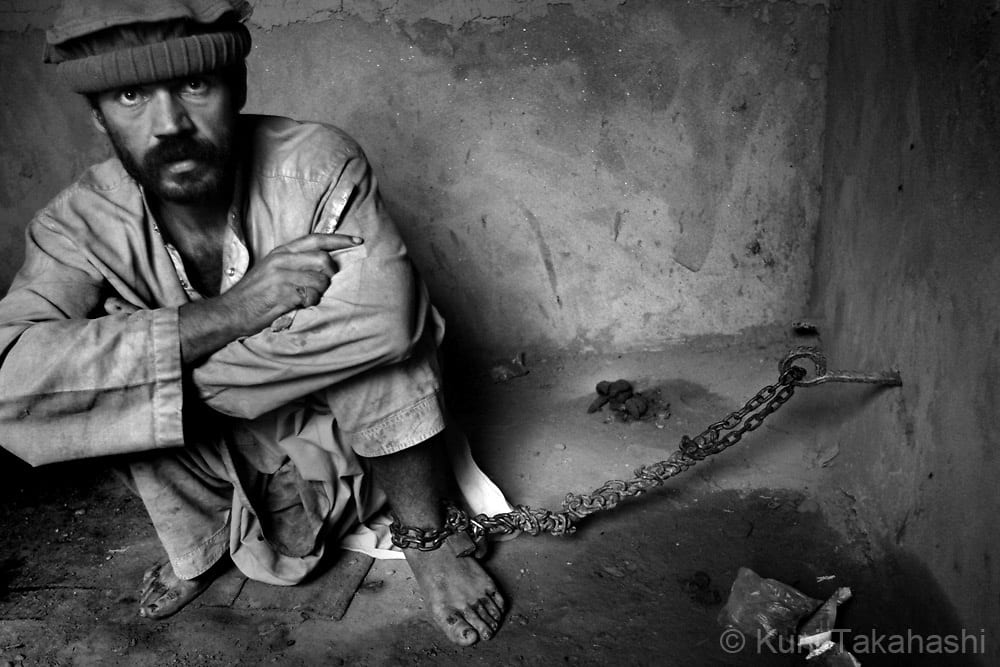
“I used to be chained around the waist and one ankle. My waist used to hurt because the chain was so heavy. My leg used to hurt, I would scratch it and cry. I felt relieved when the chain was removed.”
–Rose, Kenya
An estimated 792 million people globally – that is 1 in 10 people, including 1 in 5 children – have a mental health condition. Despite this irrefutable fact, governments spend less than two percent of their health budgets on mental health. The absence of proper mental health support and knowledge of how to cope with a mental health condition has lead to thousands of people being shackled in inhumane conditions.
“People in the neighborhood say that I’m mad [maluca or n’lhanyi]. I was taken to a traditional healing center where they cut my wrists to introduce medicine and another one where a witch doctor made me take baths with chicken blood.”
—Fiera, 42, woman with a psychosocial disability, Maputo, Mozambique, November 2019
This brutal practice is an open secret in many communities, according to Kriti Sharma, the senior disability rights researcher at the Human Rights Watch. Sharma and her team compiled a 56-page report titled “Living in Chains: Shackling People with Psychological Disabilities Worldwide,” shedding light on the conditions in which people with mental disabilities are bound by families in their own homes or in overcrowded and unsanitary institutions against their will. This is due to the widespread stigma and taboo of mental health issues within governments and health institutions in several countries. In state-run, private, traditional, and religious institutional “healing centers,” people with mental health conditions are often forced to fast, take medications or herbal concoctions, and face physical and sexual violence.

The Human Rights Watch’s study of 110 countries unveiled evidence of shackling people with mental health conditions across age groups, ethnicities, religions, socioeconomic levels, and urban and rural areas in about 60 countries. Countries that indulge in these types of practices include Afghanistan, Burkina Faso, Cambodia, China, Ghana, Indonesia, Kenya, Liberia, Mexico, Mozambique, Nigeria, Palestine, Yemen, and several more.
Though a number of countries have started to acknowledge mental health as a real problem, the inhumane act of shackling remains largely out of sight. There is no data or coordinated effort at either international or regional level to eradicate the binding of people who are mentally ill. The act of shackling impacts both the mental and physical health of someone who is already ill. Some effects include post-traumatic stress, malnutrition, infections, nerve damage, and cardiovascular problems, not to mention the loss of dignity. The #BreakTheChains Movement is an organization devoted to bringing awareness of shackling to nations and increasing access and awareness of mental health services in countries where shackling is a common problem. The movement has been successful in Indonesia where its country-wide interviews and advocacy led the government of Indonesia to deepen its commitment to #BreakTheChains. Over 48 million households in Indonesia now have access to community-based mental health services.
Laymen can also assist the movement by following two easy steps: sign the pledge, and share the movement on social media to promote awareness. It is time to acknowledge that mental health is a real issue that affects millions of people, and shackling and ignoring the issue will not resolve any issues, nor will it reduce the stigma associated with mental health. If we, as global citizens, have learned anything from this pandemic, it is how deathly and dangerous the invisibility of a disease is. Mental health is invisible like COVID-19, but there are always symptoms. Make an effort to educate yourself, and take the opportunity to check in on people by simply asking how someone has been. It really is that simple.
